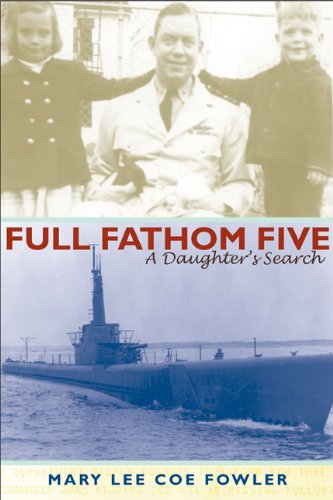I think the best book ever for Memorial Day might be Full Fathom Five – A Daughter’s Search by Mary Lee Coe Fowler. It was one of my typical museum impulse purchases. I bought it at the USS Albacore Museum in Portsmouth NH.
The funny thing is that when I looked at the reviews on Amazon, I found a two-star review that in explaining why the reviewer hated the book so much gives a great picture of why it is so good:
extremely disappointing especially after reading the 5-star raves (which compelled me to purchase the book). miscatagorized as WW2 submarine history this work rather leans toward metaphysical spirituality (reconciling her Quaker pacificism w/father’s military career), genealogy (brother sister uncle aunt cousin 3rd cousin, ad infinitum), personal baby boomer memoir (the 1950’s under stepfather’s regime), with splashes of self-indulgent romance fiction (far too lengthy imagined recreation on how Father met Mother in pre-war honolulu). the WW2 historical background panorama (filler) placing her father in his wartime context, read like something lifted from a high school history textbook….and made for further pedantic mundane reading. what little redeeming feature (for the serious WW2 US submarine warfare aficinado)seen between the pages, namely the WW2 sub veterans’ recollections of Red Coe, life on the S-39, USS SKIPJACK, USS CISCO (and myriads of possiblities as to its demise)….simply weren’t enough. other aspects including Skipper Coe’s toilet-paper requisition (gag) order (and its ramfications) were beaten to death to the point of tiresome redundancy. the audience appeal of this work would be to her fellow AWON (American WW2 Orphans’ Network) membership. for the WW2 US submarine warfare student…a single distilled and compressed chapter is all that would have been sufficient.
I don’t know if I qualify as a “serious WW2 US submarine aficionado”, but the subject does interest me quite a bit and I have read a lot. US Navy WW2 submarine officers may well have been the most literary military men to have ever walked the earth. There are a lot of memoirs and related works. The overall story of the Pacific Fleet Submarine force is fascinating. They had something like 2% of the manpower of the US Navy and accounted for something like 50% of the Japanese ships sunk.
There are all sorts of interesting aspects to the story. Early in the war skippers who came from a “safety culture” were weeded out in favor of those who were more daring developing radical departures from pre-war docttine such as the night surface attack, There was the bureaucratic nightmare that made it so difficult to confront the torpedo problems. It turns out that the magnetic field of the Earth is not uniform so that magnetic exploders that worked great near Groton, Ct were not so great in the Pacific. I mean – Who knew?
The typical memoir ( My favorite by the way is Silent Running by James Calvert) will actually recount every single torpedo fired on war patrol by that officer. A skipper was limited to five war patrols and they only had 24 torpedos on board, which they fired in spreads of three, so it doesn’t take that long. There will be some interesting shore leave stories and some other exciting incidents on patrol along with an overview of the big picture. Besides the detailed logs and after action reports, there will be research in Japan to clarify exactly what ship was being attacked or doing the depth charging. I love those books. Can’t get enough of them.
And Ms. Fowler actually manages to write that book for her father, Commander James Coe could not write it for himself. On 19 September 1943, USS Cisco (SS-290) left Port Darwin, Australia with Commander Coe as skipper. USS Cisco is, as they say, still on patrol.On 8 February 1944 she was reported overdue and presumed lost.
That part of the book would be the single distilled chapter that would have pleased the aficionado, but Ms. Fowler’s book is much more ambitious and succeeds beautifully. She was born slightly after her father’s boat sailed on its eternal patrol and grew up knowing very little about him. By the time she was a toddler her mother had married a man who would be a difficult step-father and there was little said of her father.
It was only after her mother died and she found things of her father’s, like his bridge coat, preserved that she went on the journey to learn about him. She did the research that is standard for a submarine memoir and then some. She interviewed wives of other officers including Roberta McCain, Senator John McCain’s mother. She is able to tell the story of her mother and father’s romance and the somewhat idylic life of a pre-war Navy wife, whose parents helped support her. And then there is Ms. Fowler’s own story as a war orphan, who must be quiet about it and her journey in later life to uncover her father’s story.
Whatever its flaws might be to the aficionado, this is one of the most holistic World War II memoirs you will ever encounter. It is fitting for Memorial Day, as it reminds us that between those crosses row on row there are more than poppies. Their are countless loved ones left behind, few who will have the opportunity to engage with the story of the lost one in the way that Ms. Fowler has.
If you are going to read only one submarine book. Well that’s just silly. Nonetheless, if you are going to read only one. This is the one.
Peter J Reilly CPA hopes to be the first tax blogger to give up his day job and fancies himself an amateur historian. He is embarrassed to disclose that his fascination with WWII submarines originates from reading War And Remembrance and watching the miniseries.
He also blames his big brother, who chased Russian submarines in the early sixties and recommended the Wahoo by Richard H. Okane.
































































































Trackbacks/Pingbacks